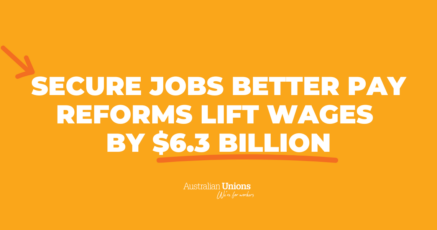They grew up during the Global Financial Crisis, survived a decade of conservative governments, and now are well and truly adults. Millennials are thirty, flirty and so not thriving.
Sign our petition asking for a 7% increase to the minimum wage
Writer and Economist Alison Pennington’s new book Gen F’d described the struggle of Millennials (or Gen Y) as they try to achieve success in a system set against them.
“Millennials and younger people have inherited an absolute Cluster F of an economy,” Pennington said in a recent interview.
“It’s the collapse of the ‘fair go’ as we know it.”
The ‘fair go’ is the dream that Millennials and Gen Z were fed from birth: study hard, land a decent paying job, buy a house, and live a comfortable life.
But just one glance at wage growth over the past decade and you can see why that dream is exactly that – just a dream.
Over educated and under paid
Compared to Baby Boomers and Gen X, millennials are more likely to hold more educational qualifications. And yet, they’re earning less and dealing with a far higher cost of living than previous generations were at the same age.
Whereas tertiary education was once seen as a guaranteed path to success, it’s now normal to be working as a trolley boy with a postgraduate degree.
Despite being told to expect stability by the time they hit their 30s, millennials have struggled to escape unreliable work and poor wages.
Alison Pennington spoke first-hand about her experience finding decent work as a millennial.
“For most of my 20s, I was sick with anxiety from insecurity and just wondering when I would get my break – which would be a secure job – because then I could join a union and do things about how bad things were for my generation and for working people.”
“It wasn’t until I got a secure job that I got to have youth. It was in my late 20s when I got to have that period of ‘reckless abandon’ in full-time work,” she said.
The numbers show her experience did not occur in a vacuum. Home ownership is heading downhill with no sign of easing for Gen Z who have hit their 20s.
Even younger workers who owned their home were burdened with massive rate rises.
“What do they have to look forward to? It’s precarity on every level,” Pennington said.
“They’re living week to week wondering, ‘How am I going to get enough income to keep a roof over my head?’, ‘What’s the point of a job if I’m going to be at the behest of the rental system all my life?’.”
Minimum wage increase crucial for younger workers
Faced with a cruel rental market and little chance at full-time employment, the very least millennial and younger workers need is a wage increase that keeps up with cost-of-living hikes.
Around one in four workers in Australia rely on minimum wages – either the national rate or the Award specific rate. The majority of those workers are young.
And guess what – the younger you are, the worse it gets. Although the national minimum wage is $21.38 per hour, if you are less than 21 years old, you can be paid even less thanks to junior rates.
Living out of home at 18 and paying rent? Congratulations, the national minimum wage gives you a whole $14.60 per hour.
There are also literally hundreds of thousands of children in Australia who are under the age of 16 and work. They can legally be paid $8 per hour.
Last year, union members won a five per cent increase to the national minimum wage. But cost-of-living is even worse than in 2022. If your pay isn’t matching price hikes to food, fuel and housing then you’ll be forced to cut back even more.
That’s why a seven per cent increase to minimum wages are essential to keep your head above water. We won last year, and we need your help to do it again.






SHARE:
Do Millennials and Gen Z really have it that tough?